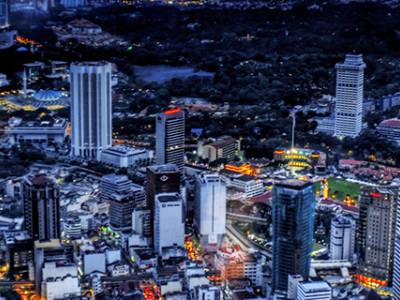I just read an MBA jobs trends report, and found some salary information that might be useful for those looking at schools in Asia. Here is the breakdown of average salaries of MBA grads working in Asia for multinational companies broken down by country (in US$):
China: $59,700
Hong Kong: $87,500
Japan: $92,000
Malaysia: $75,500
Thailand: $42,500
Vietnam: $48,000
Not much is really surprising, except for that fact that salaries in Malaysia are generally higher than China. That makes University of Malaya, the only internationally-accredited university in the country, look very good.
Of course, salaries in Hong Kong are high but the city is notoriously expensive. If I was looking at Hong Kong, I'd check out HKU, CUHK, HKUST, etc. No shortage of great , accredited schools there.
Japan is harder. It's generally pretty expensive there and there isn't as much of a b-school scene as in Hong Kong. Keio Business School and Temple come to mind as good places to go in Japan.
Comparing salaries in Asia
Posted Nov 16, 2011 19:35
China: $59,700
Hong Kong: $87,500
Japan: $92,000
Malaysia: $75,500
Thailand: $42,500
Vietnam: $48,000
Not much is really surprising, except for that fact that salaries in Malaysia are generally higher than China. That makes University of Malaya, the only internationally-accredited university in the country, look very good.
Of course, salaries in Hong Kong are high but the city is notoriously expensive. If I was looking at Hong Kong, I'd check out HKU, CUHK, HKUST, etc. No shortage of great , accredited schools there.
Japan is harder. It's generally pretty expensive there and there isn't as much of a b-school scene as in Hong Kong. Keio Business School and Temple come to mind as good places to go in Japan.
Posted Jul 21, 2012 15:22
I just read an MBA jobs trends report, and found some salary information that might be useful for those looking at schools in Asia. Here is the breakdown of average salaries of MBA grads working in Asia for multinational companies broken down by country (in US$):
China: $59,700
Hong Kong: $87,500
Japan: $92,000
Malaysia: $75,500
Thailand: $42,500
Vietnam: $48,000
Not much is really surprising, except for that fact that salaries in Malaysia are generally higher than China. That makes University of Malaya, the only internationally-accredited university in the country, look very good.
Of course, salaries in Hong Kong are high but the city is notoriously expensive. If I was looking at Hong Kong, I'd check out HKU, CUHK, HKUST, etc. No shortage of great , accredited schools there.
Japan is harder. It's generally pretty expensive there and there isn't as much of a b-school scene as in Hong Kong. Keio Business School and Temple come to mind as good places to go in Japan.
i have read disscusion on MBA in malaysia.
everyone had been saying that doing an MBA from there is crap. How it is possible that salaries there is high as compare to china
China: $59,700
Hong Kong: $87,500
Japan: $92,000
Malaysia: $75,500
Thailand: $42,500
Vietnam: $48,000
Not much is really surprising, except for that fact that salaries in Malaysia are generally higher than China. That makes University of Malaya, the only internationally-accredited university in the country, look very good.
Of course, salaries in Hong Kong are high but the city is notoriously expensive. If I was looking at Hong Kong, I'd check out HKU, CUHK, HKUST, etc. No shortage of great , accredited schools there.
Japan is harder. It's generally pretty expensive there and there isn't as much of a b-school scene as in Hong Kong. Keio Business School and Temple come to mind as good places to go in Japan.
</blockquote>
i have read disscusion on MBA in malaysia.
everyone had been saying that doing an MBA from there is crap. How it is possible that salaries there is high as compare to china
Posted Jul 21, 2012 18:34
Perhaps the best paid MBAs in Malaysia studied elsewhere?
Posted Jul 22, 2012 10:31
is malaysian economy is so good that they can afford MBA grad. at high salaries.
mostly in which field.... they hire MBA grad.
mostly in which field.... they hire MBA grad.
Posted Jul 22, 2012 13:56
1) Japan: $92,000
2)Hong Kong: $87,500
3)Malaysia: $75,500
4)China: $59,700
I would have expected Singapore in third position.. (And the 75500$ would make sense there)
2)Hong Kong: $87,500
3)Malaysia: $75,500
4)China: $59,700
I would have expected Singapore in third position.. (And the 75500$ would make sense there)
Posted Jul 22, 2012 18:20
Singapore will be above Malaysia. Perhaps it is not in that article?
Posted Jul 22, 2012 20:52
The major multinationals hiring MBAs in Malaysia are in technology, energy, finance and consulting: especially Intel, Dell, HP IBM, Accenture, Shell, Standard Chartered and Frost & Sullivan. Ericsson and Citi hire fewer MBAs, but at a more senior level.
They have very often studied at international universities with presence in Singapore: University of South Australia; University of Southern Queensland; Manchester Business School; Charles Sturt University and the University of Strathclyde. Generally, the senior people have all studied at Australian or UK universities (Imperial and also Nottingham stands out: it has a large campus in Malaysia), or at INSEAD.
The three big Malaysian MBA recruiters (Telekom, Mazis and Petronas) recruit mostly from local universities, especially Multimedia University, Universiti Utara Malaysia and Universiti Putra Malaysia, but Strathclyde, RMIT and Melbourne also feed in there.
They have very often studied at international universities with presence in Singapore: University of South Australia; University of Southern Queensland; Manchester Business School; Charles Sturt University and the University of Strathclyde. Generally, the senior people have all studied at Australian or UK universities (Imperial and also Nottingham stands out: it has a large campus in Malaysia), or at INSEAD.
The three big Malaysian MBA recruiters (Telekom, Mazis and Petronas) recruit mostly from local universities, especially Multimedia University, Universiti Utara Malaysia and Universiti Putra Malaysia, but Strathclyde, RMIT and Melbourne also feed in there.
Posted Jul 23, 2012 11:45
Singapore will be above Malaysia. Perhaps it is not in that article?
It was, I just didn't list it. Here's the full list - remember, these are hires by only multinational companies, not local ones:
1. Japan $92k
2. Hong Kong $87.5k
3. Singapore $82.5k
4. Malaysia $75.5k
5. S. Korea $70.3k
6. China $59.7k
7. Vietnam $48k
8. Thailand $42.5k
It was, I just didn't list it. Here's the full list - remember, these are hires by only multinational companies, not local ones:
1. Japan $92k
2. Hong Kong $87.5k
3. Singapore $82.5k
4. Malaysia $75.5k
5. S. Korea $70.3k
6. China $59.7k
7. Vietnam $48k
8. Thailand $42.5k
Posted Jul 23, 2012 17:34
Considering the low cost of living in Malaysia, that is a nice salary.
Posted Jul 24, 2012 12:41
Indeed - in Kuala Lumpur you can find apartments for a fraction of the cost of similar ones in Singapore - along the lines of what you'd see in a city like Berlin. I think Penang in the northwest is where the growth is at - a lot of big tech firms like Motorola, Dell and Seagate have plants or other infrastructure there.
Posted Jul 24, 2012 18:31
Indeed - in Kuala Lumpur you can find apartments for a fraction of the cost of similar ones in Singapore - along the lines of what you'd see in a city like Berlin.
sir you had been taking about salary in asian countries. What are your views about india?
thank you Duncan for your reply
sir you had been taking about salary in asian countries. What are your views about india?
thank you Duncan for your reply
Posted Jul 25, 2012 07:49
Do you have a more specific question in mind? I'm sure you are not actually asking what I think of India.
Posted Aug 13, 2012 11:26
sir i wanted to ask about salary in india??
Posted Aug 13, 2012 20:28
What is your question about salaries in India?
Take a look at https://www.google.co.uk/search?q=average+MBA+salary+India&aq=f&sugexp=chrome,mod=10&sourceid=chrome&ie=UTF-8
Take a look at https://www.google.co.uk/search?q=average+MBA+salary+India&aq=f&sugexp=chrome,mod=10&sourceid=chrome&ie=UTF-8
Posted Dec 27, 2021 15:02
The major multinationals hiring MBAs in Malaysia are in technology, energy, finance and consulting: especially Intel, Dell, HP IBM, Accenture, Shell, Standard Chartered and Frost & Sullivan. Ericsson and Citi hire fewer MBAs, but at a more senior level.
They have very often studied at international universities with presence in Singapore: University of South Australia; University of Southern Queensland; Manchester Business School; Charles Sturt University and the University of Strathclyde. Generally, the senior people have all studied at Australian or UK universities (Imperial and also Nottingham stands out: it has a large campus in Malaysia), or at INSEAD.
The three big Malaysian MBA recruiters (Telekom, Mazis and Petronas) recruit mostly from local universities, especially Multimedia University, Universiti Utara Malaysia and Universiti Putra Malaysia, but Strathclyde, RMIT and Melbourne also feed in there.
Do local recruiters Telekom, Mazis, and Petronas recruit fewer from UM MBA Sir?
They have very often studied at international universities with presence in Singapore: University of South Australia; University of Southern Queensland; Manchester Business School; Charles Sturt University and the University of Strathclyde. Generally, the senior people have all studied at Australian or UK universities (Imperial and also Nottingham stands out: it has a large campus in Malaysia), or at INSEAD.
The three big Malaysian MBA recruiters (Telekom, Mazis and Petronas) recruit mostly from local universities, especially Multimedia University, Universiti Utara Malaysia and Universiti Putra Malaysia, but Strathclyde, RMIT and Melbourne also feed in there. [/quote]<br><br>Do local recruiters Telekom, Mazis, and Petronas recruit fewer from UM MBA Sir?
Posted Dec 27, 2021 20:16
Take a look at: How to use LinkedIn to find the best school www.find-mba.com/board/33571
Posted Dec 29, 2021 16:16
Something's really off on the Malaysia figures here that were posted 10 years ago.
Malaysia's #1 MBA program is ASB (an affiliate of MIT), so that should represent the top end of Malaysian MBA salaries.
ASB's median MBA salary in adjusted PPP $ according to ASB's career report is $113,899. But that's PPP, which takes into account the local country's average expenditure basket of goods. An MBA will have a different type of consumption (new cars, higher end housing, etc). The actual US$ salary of ASB (adjusted back from PPP) is roughly $43,000. That's a good salary in Malaysia, but that represents the top end. The average is likely much lower. So I can't believe an MBA averages US$75.5K in Malaysia back in 2011. Just too hard to believe. It's possible the average stated by ezra is PPP adjusted and not real dollars.
[Edited by MKennedy on Dec 29, 2021]
Posted Dec 29, 2021 22:02
Ezra cited the report's description of the average salaries of MBAs in multinationals, not those of all MBAs. See table 21 at https://content.qs.com/pr/TopMBA.com_Jobs_&_Salary_Report_2011-12.pdf and perhaps read the methodology and sample employers.
Posted Mar 09, 2023 15:58
Malaysia's #1 MBA program is ASB (an affiliate of MIT),
While I realize that I am reviving an old thread I nevertheless am afraid that I must strongly dispute the notion that ASB is the #1 MBA program in Malaysia. I believe that the Malaysian MBA programs at UM and other well established Malaysian universities would be far more deserving of that accolade. The fact of the matter is that ASB has been poorly managed. The founding ASB Dean was fired (or, rather, strictly speaking, he supposedly did not seek renewal of his contract, but let’s speak truthfully here: he was fired.) The next Dean was supposed to serve as an Interim Dean for only a few months - which ultimately stretched to 7+ months as ASB struggled to find a permanent Dean. The ASB campus stands mostly empty as ASB has not come even close to meeting its enrollment KPI’s. Indeed, I strongly suspect that even the MIT affiliation - which is set to expire in less than 2 years anyway - will eventually be terminated, whereupon ASB’s fate will likely be that of the Malaysian Institute for Supply Chain Innovation (the ‘other’ MIT initiative in Malaysia that ultimately failed).
Posted Mar 09, 2023 17:03
If you think that brand-new business schools normally fill their campuses after a few years, you should reset your expectations. Most new business schools don't even have campuses! Oxford's business school was in a hospital corridor. and either EDHEC or ESSEC started in part of a Singapore library. These schools take years to build. The founding deans take on a perilous job and are often people at the end of their careers: certainly that was the case with the deans who set up ESMT and HHL.
Indeed, the idea that the MISCI failed is a bit weird. It was founded in 2011, and it's now a full university. The students have excellent salary growth. The partnership with MIT is still running. If that's failure, then I wonder what success would look like?
PS UM certainly graduates more MBA students, but I don't think there's any data to suggest that its average salaries and cohort quality come close to ASB.
[Edited by Duncan on Mar 09, 2023]
Related Business Schools
Other Related Content
MBA Programs in Southeast Asia: Tapping Into the Tiger Cubs
Article Oct 30, 2013
A number of accredited MBA programs are meeting specific needs in this fast-growing region
Hot Discussions
-
Oxford executive diplomas
Apr 01, 2024 231 9 -
Cambridge Judge vs RSM
Apr 09, 2024 213 7 -
Can’t decide between MBA from Lancaster, bath, Birmingham and edinburgh
Mar 23, 2024 183 4 -
Any guesses as to why several schools are reporting big increases in applications?
Mar 30, 2024 207 3 -
Deferred MBA advice
Mar 20, 2024 120 1 -
MBA at Imperial vs Bayes vs Warwick for international student
Mar 25, 2024 173 1 -
HHL MBA reputation
Mar 25, 2024 118 1 -
City or Manchester for MiF?
Apr 09 05:48 PM 100 1





